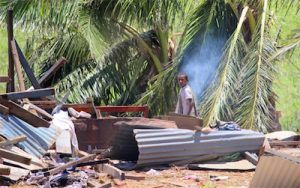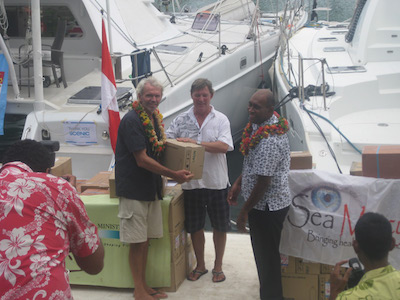Natural Disasters: Advice for Cruisers Who Want to Help
Following any devastating natural disaster such as an earthquake, tsunami, tropical cyclone or hurricane, many cruisers want to pitch in and help. Jonathon Robinson from Sea Mercy (Fiji) has some advice for cruisers on how to (and how not to) help out after a natural disaster.
Published 3 years ago
1. Overview:


- Photo (c) Sea Mercy
a). Each Nation has its own National Disaster Management Organisation (NDMO), National Emergency Management Organisation (NEMO) or equivalent. These organisations coordinate efforts during the four phases of a disaster:
- Mitigation,
- Preparedness,
- Response; and
- Recovery.
b). These organisations are supported by both National and International Government and Non-Government Organisations (NGOs). Many of these have worked together for years.
c). The commonly accepted standard is “The Sphere Handbook.Humanitarian Charter and Minimum Standards in Humanitarian Response.”
2. Cruiser Preparedness:
Ask yourself:
a). “In the event of a disaster in my area, am I ready and able to look after myself, my vessel and my crew without becoming an extra burden on local resources
b). “Is there a cruising community, club or association that could support local organisations with Disaster Mitigation and/or Preparedness?” Cruisers possess a wide range of life skills that can support community projects.
3. Cruiser Response and Recovery:
The Golden Rule: “Do not become part of the Disaster.”
a). If you are in the affected area and are able to Respond (or later to assist with Recovery efforts) strive to do so as part of the National coordinated relief efforts.(see 2.b above.).
b). If you are not in the affected area but are considering sailing to assist, ask yourself:
“If there was no disaster, would I normally sail there, with this amount of cargo, at this time of year?”(cyclone/hurricane season). See “Golden Rule” above.
c). If you are considering bringing or sending aid, ask yourself:
- “Are aid items available for purchase in country? If so, am I better spending my money there to assist economic recovery?”
- “What aid is needed and appropriate?”rather than “what aid do I want to give?”
- “What will happen to any aid supplies that I bring or send? Who will pay for their import clearance, storage and distribution?” Biosecurity and Revenue and Customs laws still apply and many host states will now only accept aid that is specifically requested and approved by them.
- “Should I send aid to the family I met when I was last cruising there?”
Many cruisers understandably want to assist a family they may have met previously. With the above points (1 – 4 ) in mind, also consider the social consequences for that family if they receive preferential treatment over their neighbours.


- Photo (c) Sea Mercy
Attached below is an article from The Australian Red Cross on unsolicited aid which relates to Tropical Cyclone Winston which affected Fiji in 2016.
4. Conclusion
There is no single right way to respond. Every disaster is different, as are every cruiser’s circumstances. I hope the above points provide some food for thought and promote ideas and discussion within the cruising community.
Jonathan Robinson
Sea Mercy (Fiji)
………………………………………………………………………………………………………………………………………
About the Author
Jonathan Robinson and his wife Donna have been cruising full time since 2014. They are Sea Mercy volunteers and over the last six years Jonathan has coordinated that organisation’s responses to Cyclones Pam and Harold (Vanuatu) and Winston, Yasa and Ana (Fiji)and COVID-19 (Fiji).
For more information visit:
Sea Mercy Facebook page
Sea Mercy website
………………………………………………………………………………………………………………………………………
Australian Red Cross: The shirt off your back
………………………………………………………………………………………………………………………………………
The opinions expressed in this article are the author’s own and do not reflect the view of Noonsite.com or World Cruising Club.
Related to the following Cruising Resources: Earthquakes and Tsunamis, General, Hurricanes and Tropical Cyclones, Safety and Medical, Weather

Very well said Jonathon.
We well remember in 2016 being amazed, and rather saddened, by the amount of rubbish that was sitting in the warehouse in Savusavu, Fiji, all of which was donated by “well meaning” folk in Australia and New Zealand. Piles of bags of “clothing”, mostly completely inapplicable for Fiji’s climate and cultural environment. Tinned foods, a lot of which Fijian folk would be unlikely to eat and so on.
We were, and continue to be, very impressed by Sea Mercy’s co-ordinated approach in the South Pacific, and pleased to have played a small (very small!) part in trying to assist after cyclone Winston.
Some sailors are extremely resourceful and capable.
I remember carpenters who had tools with them working in Makongai to rebuild buildings, a Canadian guy who had a chainsaw on his boat – just what was needed to deal with fallen trees etc…
We have medical backgrounds and carry comprehensive medical kits, so were able to assist with injuries, and in one case a heart attack….
These are the kind of things that are needed…bags of donated clothing, no, sorry.